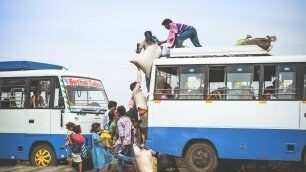Rescued Families Return Home as Kiln Owner Faces Charges
Slavery

CHENNAI, INDIA, March 11, 2016
This week, hundreds of families rescued in IJM’s largest anti-slavery operation ever returned to their home villages, and the man responsible for their abuse waits in custody to finally be held accountable for his crimes.
This is the second time this powerful brick kiln owner has been arrested on charges of bonded labour slavery.
In 2011, IJM and local police rescued 512 children, women and men who had been forced to work in his factory. The owner was arrested, but later released on bail. IJM and local authorities argued for him to be returned to custody as the case progressed, but he remained free. That legal case is still waiting for trial today.
Just in the last few months, IJM and police discovered the kiln owner had begun trafficking more families to work in a brick kiln—and we collaborated to bring all 564 people to safety last week. Read about the thrilling rescue here.
Police arrested the kiln owner again, as well as five of his accomplices, and plan to charge him under the Bonded Labour Act and under newer provisions of the Indian penal code directly related to slavery and trafficking. This new law, passed in 2013, has helped bring stronger cases against traffickers and business owners using slave labor, and better protects the vulnerable poor from this kind of violence.

Rescued Families Return Home to Recover
Now safe from this kiln owner’s brutality, the 564 people rescued last Wednesday are just beginning their new lives in freedom.
Read about the abuse these families endured and the hard-working officials who rescued them in The Hindu and The Deccan Chronicle.
After the families gave their statements to police and received official Release Certificates, IJM and local officials arranged train transport back to their home villages.

Most of the rescued labourers in this case—and many other IJM cases in the last few years—had been trafficked from Odisha, a state north of Chennai where many people work as seasonal manual laborers.
IJM caseworkers will collaborate with the local government to help these families resettle and get access to rehabilitation resources—including a Beneficiary Card granting access to medical care, tool kits and other benefits. They will also get free housing and ration cards for food and other necessities.
"The Odisha government has been very supportive,” says Neenu Thomas, IJM’s associate director of aftercare. "They have provided survivors with opportunities to be part of a livelihood support program which guarantees 100 days of employment. More than 30 families have received houses in the last month. We are hopeful that, with the government’s continued support, we will be able to combat the issue of trafficking in Odisha.”
Families in Odisha will join IJM’s two-year aftercare program to encourage their rehabilitation and monitor their progress. IJM visits each family regularly to provide training on basic skills and ensure children can return to school.
Each community will be supported with monthly meetings to learn how to stay safe and support one another. During these meetings, they will also be encouraged by women and men rescued years before and thriving today.
IJM staff will also be creating rehabilitation plans for each family, including economic empowerment to help them find dignified work. Some will find safe jobs in their home community; others will learn how to start their own small businesses or access training programs. Finding work can be a challenge in some poorer areas, but we're committed to walking with these families as they rebuild.
Stay tuned for more updates on these rescued families and the legal case against this kiln owner in the months to come. You can make this work possible by joining us as a Freedom Partner today.